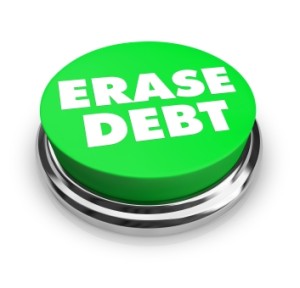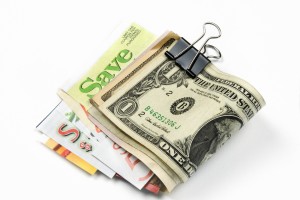Many claims that saving becomes more and more difficult due to the high cost of living. This may be true in a sense, on the other hand, saving money seems impossible at times because of how we treat money. We allow money to easily slip through our fingers sometimes without giving it a moment of thought. Then we find that saving is not an option right now and that is how the act of saving money seems challenging. Saving does not depend on your income or your expenses, here are ways to help change the way you handle money in the future:
 1. Stop Making Debt
1. Stop Making Debt
Often you might say or hear someone say “Saving is not an option for me now, I have way too much debt”. But the very next day we get ourselves further into the very situation that is believed to obstruct the act of saving money. Refrain from using any credit facility to make purchases, even if it means cutting up all your credit and store cards. The less debt you have the more opportunity there would be to save money.
2. Don’t Pay Interest Unnecessarily
Debt prevents most people from saving money due to the high interest rates that consumers are obligated to pay as a result of buying now and paying later. Small purchases made on credit are the reason why many consumers fall under the debt trap, to begin with. Purchasing an item worth R200 on credit with a payment plan of 12 months on an interest-bearing account is one example of paying unnecessary interest. Save for a couple of months to buy the item cash instead of to spare yourself from paying interest for an entire year for small purchases. The money that you would have contributed towards interest could have been saved for future purchases.
3. Settle All Debt
Compile a list of all your debt-related expenses such as accounts, store cards, credit cards, personal loans, etc. Work on a strategy to decrease the amount of debt you have. One way to really do this is to focus on one account at a time until it is settled. Select the account with the lowest balance as a starting point to slowly change the way you deal with debt. Make it a priority every month to pay double the total due amount, for example, a store account with a 12-month payment plan can be settled in 6 months by using this strategy. As soon as the account is settled follow this process with the next account until eventually all your debt is squared up. The freed-up money you find yourself with after having no debt can go towards saving.
4. Consider Debt Consolidation
Those battling to keep up with debt repayments should apply for debt consolidation. It has its pros and cons, but at the end of the day, you have more of your income at your disposal each month allowing you to cope with living expenses as well as making it possible for you to focus on saving money.
5. Purchase an Investment
The only justifiable interest-bearing purchase is an investment such as purchasing a house. A home loan is considered an investment because it is one of your assets. Therefore, investing in property is a great way to save money as opposed to renting. Think of it this way: the money that you spend on rent over 10 or more years could have been used to pay almost half your bond.
6. Pay Extra on Your Home Loan
By ridding yourself of all insignificant debt obligations, you now have a lot more funds at your disposal. A smart manner to make use of the additional funds is to commit to paying extra on your home loan installment each month. This could reduce your payment term noticeably, depending on how committed you are to settle your home loan. Also the amount of interest you pay drops, saving you money long-term.
7. Open Multiple Savings Accounts
You save money to accomplish various things and one savings account is not enough. Have savings account for each goal you want to achieve, for example, one saving account for that holiday you planning, another to renovate your home, and not forgetting the most important savings account: your emergency fund. This is a useful way to save as it allows you to monitor how you progressed in reaching each goal. Set up the amounts you want to deposit into each account depending on whether it is a short or long-term goal and the total amount you need for each occasion.
8. Save First Then Spend
We often determine the amount we can save by first calculating all our expenses then allocating what is left over to a savings account. It should be the other way around, you first need to reserve money for saving before deciding what you should spend your money on. Never leave saving as an afterthought, it should be your main concern.
 9. Budget for Saving Money
9. Budget for Saving Money
List saving as an expense when doing your monthly budget and be sure that it takes priority over entertainment. Working it into your budget is one way to ensure that you save dutifully and you would see growth in no time.
10. Deduct Savings Deposit from Your Salary
Many times we open that savings account and make deposits for the first couple of months and thereafter we find other ways to use that money. Allow your savings account to debit the specified amount from your salary. This way you are guaranteed that you regularly contribute to your savings and the habit of saving is forced upon yourself.
11. Not Spending Money Equates to Saving Money
One of the easiest ways to save is to simply not spend money. By deciding against making an unimportant purchase you have already saved money. Fancy savings account offering the highest interest rates is not the only solution to saving money. Sticking your money in a jar is also a means of saving and to make sure that it stays there for longer is to just leave it alone instead of finding reasons to spend it.
12. Justify Each Purchase
Before making any purchase ask yourself if it is needed or wanted. And classifying the purchasing of coffee every morning before heading to work as a need is not justifiable. Drink water instead because it is healthier and free. If there is another solution that involves spending less or no money then the purchase is not justified. Choosing the less expensive option allows you to save money.
13. Always Negotiate
The ability to drive a good bargain is a useful skill to have especially when making big purchases. Seize any opportunity to negotiate with the seller to lower the price. Target independently owned shops and stalls, most times they are willing to negotiate to make a sale.
14. Purchase Second-Hand
Before heading to the store, try and find want at a second-hand store. You can get it almost for half the price compared to purchasing it brand new. Just make sure that it is worth the bargain and in good condition before buying anything second-hand as you would not receive a warranty.
15. Generic Brands
Keep your eye on the price rather when shopping and opt for generic brands as they are always the less expensive option. It never hurts to choose the less popular brands that look and function the same as the household brand names. When trying to save money it pays to be oblivious to name brands.
16. Find a Substitute for Money
Thinking of purchasing a relatively expensive item? Hit the classifieds or trading websites to find someone willing to make a swop for an item that you have of the same value. By swopping you kill two birds with one stone as you get rid of the item you don’t want and receive the item you want at the same time without it costing you a cent.
Or maybe someone you know has something to sell that is of interest to you. Instead of buying it in cash, think of something that you could do as payment for getting that particular item. The less you spend on purchases the more you can save money.
 17. Sell Unwanted Goods
17. Sell Unwanted Goods
When in the business of saving money you should never just throw away items of value that you no longer need or want. Use the classifieds or trading websites to sell your goods to put a few hundreds back into your pocket.
18. Join Loyalty Programs
Be rewarded by merely shopping or making use of a service. Loyalty programs are exceptionally helpful in assisting consumers to save by issuing coupons or vouchers to use against future purchases. These rewards allow you to save hundreds or sometimes thousands on grocery shopping annually.
19. Do Not Get Lured into False Bargains
Be aware of promotional offers that trick you into buying things that you do not need or in excessive quantities all because it is a special offer. This is where your justifying purchasing skills come in handy when deciding the worthiness of the offer. Many people try and justify pointless purchases by claiming that it was an offer they could not refuse. You are not always the winner when buying 5 items for the price of 4 when you really only need 1 of them.
20. Quit Habits That Cost Money
Start by quitting cigarettes, it is an expensive and unhealthy habit. Many smokers will finish a packet of cigarettes a day. A packet of the average brand of cigarettes costs about R21. As a smoker, you are literally blowing close to R600 a month. Money that could have contributed to your savings account or even to settle some debt.
Non-smokers are not off the hook, there are many other habits that people indulge in that cost quite a bit on a monthly scale. For example, buying fast food for lunch every day. A reasonably priced meal costs about R30, which also amounts to R600 a month spent that could have been saved by making the effort to pack in lunch instead.
21. Generate Extra Income
Rent out a room or turn your hobby into a small business to supplement your income. Deposit the money straight into a savings account or use it as an additional payment on the debt.
22. Share Costs
Share daily costs with family, friends, and colleagues by clubbing for various purchases and making use of the goods or services together. For example, find someone to share a gym membership with on one of those 2 for the price of 1 contract that is on offer. Or start a lift club to share the cost of traveling to and from work every day. As a result, you spend a fraction of the cost for things you would have paid full price for had you done it alone.
23. Review Your Banking Methods
Inspect your bank statement to check that you are not paying more than you should on banking fees. Find a method of banking that is suitable for your needs as well as cost-effective. Cheque accounts usually work best to manage your salary. Open a cheque account if you do not already have one and choose one that would complement your monthly banking transactions.
24. Review Car Insurance Options Annually
Every year the value of your car drops, make sure that you are not paying too much on your car insurance premiums. Get quotes from different insurance companies annually to find the best deal.
25. Start Life Insurance Early
Applying for life insurance later could cost you. See that you are covered to dodge the high premiums you would have to pay each month. Getting life insurance at your earliest convenience helps you save thousands of rands.

Leave a Reply